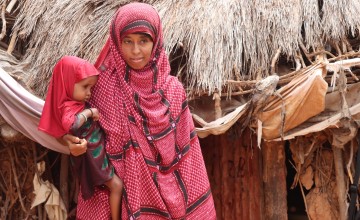
Read our 2024 annual report

Knowledge Hub
Foreign Affairs Minister and Concern Worldwide launch programme to combat child hunger in the Horn of Africa

An Tánaiste and Minister for Foreign Affairs, Micheál Martin today launched a multi-million Euro Irish Aid-funded programme which aims to prevent the development of one of the worst forms of child malnutrition among communities in the cross border areas of Kenya, Ethiopia and Somalia.
It’s expected more than a quarter of a million people will be reached during the three-year programme ran by Irish humanitarian organisation Concern Worldwide alongside their long-term partners in the region.
“Climate shocks such as drought and flooding, along with localised conflicts and rising inflation has created a silent crisis of child malnutrition in the border areas of Kenya, Somalia and Ethiopia,” said Suzanne Elder, programme director with Concern.
“Malnutrition and hunger are entirely preventable. Through focusing on preventing child wasting, we can tackle the most immediate, visible and life-threatening form of malnutrition, and in doing so reduce the risk of children becoming severely ill or worse, dying from hunger.”
Child wasting is when a child is too thin for their height due to rapid weight loss or a failure to gain weight caused by acute but severe periods of food shortage, or disease, or both. This can be as a result of periods of severe food insecurity in a population – such as during famine, or following consecutive, very poor harvests. Children who are wasted have weakened immune systems, making them more vulnerable to infections and diseases with a higher risk of mortality, especially from common illnesses like diarrhoea and pneumonia.
In recent years Ethiopia, Kenya and Somalia – located in the region known as the Horn of Africa – have experienced consecutive droughts, leading to water scarcity, crop failures, and livestock losses. Most recently in 2024, there has been intense flash flooding causing displacement, destruction of infrastructure, and loss of life. As a result, this region is characterised by some of the highest rates of malnutrition in the world.
Irish Aid is providing €15 million over three years for the Hanaano programme, which means ‘to nurture’ in the Somali language. The programme aims to reach 300,000 people and will be led by communities who will identify and develop the solutions they see as working for them. Lessons learnt from this community-led approach will inform regional and country strategies for child wasting prevention.
The programme aims to prevent child wasting by working with families to ensure children have access to safe and nutritious food. This means supporting young mothers throughout pregnancy and beyond; improving access to nutrition information; increasing availability of clean water to reduce disease, as well as water for growing crops. The programme will support families develop livelihood options that are profitable and climate resistant.
In Kenya and Somalia more than four and a half million people are in crisis levels or worse of food insecurity, with acute malnutrition rates ranging between 10 per cent to more than 30 per cent (approx. 1.2 million in Kenya and 3.4 million in Somalia). In Ethiopia there are an estimated 21.4 million people in need of humanitarian assistance.
Concern started working Ethiopia in 1973, Somalia in 1986 and Kenya in 2002.
For further information contact Eilis Staunton, Media Relations Officer, Concern Worldwide, at eilis.staunton@concern.net or +353 85 872 0720.
Other ways to help
Corporate support
Is your company interested in working together for a common cause?
Fundraise for Concern
From mountain trekking to marathon running, cake sales to table quizzes, there are lots of ways you can support our work.
Buy a gift
With an extensive range of alternative gifts, we have something to suit everybody.
Leave a gift in your will
Leave the world a better place with a life-changing legacy.
Volunteer with Concern
The lots of ways to get involved with our work as a volunteer
School fundraising
Without the generous support from schools, we wouldn't be able to do the work that we do.

